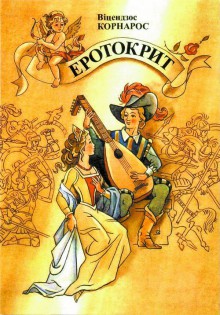The exhibit marks the publication of the first Ukrainian translation of Erotokritos and opens a cycle, “300 Masterpieces of World Literature.” The book, translated by Vasyl Stepanenko, was published by Veselka with support from the Greek art patron Gerassimos-Nikolaos Bugas.
“The romantic poem Erotokritos is a masterpiece of the Venetian-period Greek literature,” said Georgios GEORGOUNTZOS, Ambassador of the Hellenic Republic to Ukraine. “It was written in about 1640 by the Greek author Vitsentzos Kornaros in Heraklion. The poem’s theme is a forbidden love of two young people. Although borrowed from a medieval tale of chivalry, the plot is considerably reworked and enriched with Greek fairytale’s motifs. What makes this poem most valuable is its language – pure, genuine, living, and free of archaisms.”
The poem consists of 10,000 fifteen-syllable rhymed verses, also known as “political verses.” Incidentally, UNESCO decided in 1978 to put Erotokritos on the list of world culture’s 300 masterpieces.
“All residents of Crete adore this oeuvre,” the Greek ambassador pointed out. “A monument to the main heroes, Erotokritos and Aretousa, was put up in Heraklion, where the poem was written. Some fragments of the romance were set to music, and Erotokritos is sung not only by well-known singers, but also by ordinary people.”
At the same time, Modern Greek literature is not known in the world as widely as Hellenic (Ancient Greek). Although Vitsentzos Kornaros’ poem is very popular, it has only been translated into four languages: French, English, Italian, and now Ukrainian.
The translation was done by Vasyl Stepanenko, a Hellenic literature translator. It took him almost 40 years to achieve the goal of his lifetime – to translate Erotokritos. He made notes, minutely studied the original, concurrently working at the Veselka publishing house. As he retired, he plunged into the world of translation. The art patron Gerassimos-Nikolaos Bugas funded a business trip to Greece and the publication of the book itself, superbly illustrated by the artist Mykola Pshinka. A citizen of Greece, he loves Ukraine sincerely and unselfishly. “A half of my heart belongs to Ukraine,” he says.
Bugas has carried out 56 culture projects in Ukraine. Also thanks to his assistance, a Taras Shevchenko monument was erected near Athens in 2014 and an anthology, “100 Poets of Ukraine,” was published in the Greek translation. “This kind of civic projects, which are part of citizen diplomacy, are more important than governmental ones,” says Mykola TOMENKO, chair of the Native Country foundation.
The participants in this unique publishing project are going to launch this book at the University of Mariupol, Donetsk oblast, in the near future.








